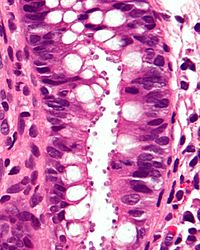Cryptosporidiosis

Cryptosporidiosis is a protozoan disease caused by small coccidia, e.g. Cryptosporidium spp, that colonize the intestinal epithelial cells of humans and of a wide variety of animals.
Clinical description
It affects individuals of all ages. It is a cosmopolitan disease that may occur sporadically or as part of an epidemic (contamination of drinking water tanks or swimming pools, or through direct interhuman transmission or contact with infected animals etc.). The disease may remain asymptomatic or may manifest as common gastroenteritis in immunocompetent patients. In contrast, signs in immunocompromised patients include severe diarrhea, which may be choleriform and require several months of parenteral nutrition.
Etiology
The two main species that infect humans are C. hominis, which infects only humans, and C. Parvum, which infects humans and several species of mammals (bovine, ovine). Parasites follow an asexual cycle inside the intestinal cells, and then a sexual cycle that leads to the production of infectious oocysts. Humans become infected by ingesting these oocysts.
Diagnostic methods
Detection of parasites in stools or on examination of intestinal biopsies is diagnostic.
Differential diagnosis
Differential diagnoses include diseases caused by other coccidia, such as cyclosporosis (see this term).
Management and treatment
None of the current treatments are 100% efficient. Some treatments are partially effective: paramomycin and nitazoxanide. Rifaximin appears to be the most effective treatment. Prevention includes reducing the risk of contamination through oocysts by respecting food hygiene recommendations and avoiding the ingestion of food or water that may be contaminated by feces.
Prognosis
There is a strong link between the immune status of the patient and the severity and prognosis of Cryptosporidium infection. Cryptosporidiosis may be life-threatening when it occurs in an immunocompromised individual, whereas it may be benign when it occurs in an immunocompetent individual.